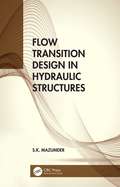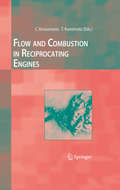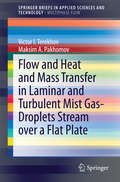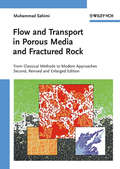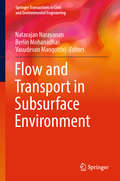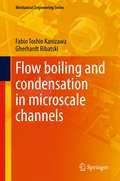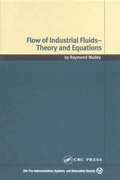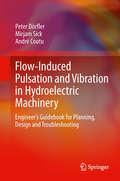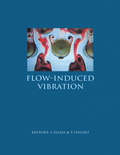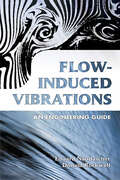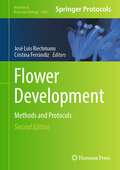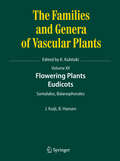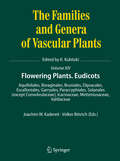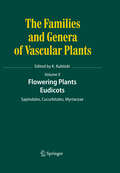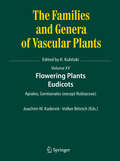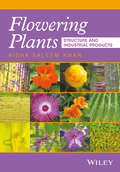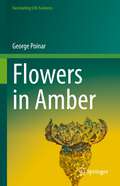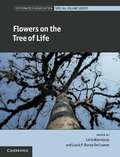- Table View
- List View
Flow Transition Design in Hydraulic Structures
by S.K. MazumderTransitions are provided in hydraulic structures for economy and efficiency. This book covers all types of flow transitions: sub-critical to sub-critical, sub-critical to super critical, super-critical to sub-critical with hydraulic jump, and super-critical to super-critical transitions. It begins with an introduction followed by characteristics of flow in different types of transitions and procedures for hydraulic design of transitions in different structures. Different types of appurtenances used to control flow separation and ensure uniform flow at exit of transition and diffusers are included. Examples of hydraulic design of a few typical hydraulic structures are given as well.
Flow and Combustion in Advanced Gas Turbine Combustors
by Michael Schäfer Amsini Sadiki Christof Heeger Johannes JanickaWith regard to both the environmental sustainability and operating efficiency demands, modern combustion research has to face two main objectives, the optimization of combustion efficiency and the reduction of pollutants. This book reports on the combustion research activities carried out within the Collaborative Research Center (SFB) 568 "Flow and Combustion in Future Gas Turbine Combustion Chambers" funded by the German Research Foundation (DFG). This aimed at designing a completely integrated modeling and numerical simulation of the occurring very complex, coupled and interacting physico-chemical processes, such as turbulent heat and mass transport, single or multi-phase flows phenomena, chemical reactions/combustion and radiation, able to support the development of advanced gas turbine chamber concepts
Flow and Combustion in Reciprocating Engines
by Take Kamimoto C. ArcoumanisOptimization of combustion processes in automotive engines is a key factor in reducing fuel consumption. This book, written by eminent university and industry researchers, investigates and describes flow and combustion processes in diesel and gasoline engines.
Flow and Heat and Mass Transfer in Laminar and Turbulent Mist Gas-Droplets Stream over a Flat Plate
by Victor I. Terekhov Maksim A. PakhomovIn this book the author presents selected challenges of thermal-hydraulics modeling of two-phase flows in minichannels with change of phase. These encompass the common modeling of flow boiling and flow condensation using the same expression. Approaches to model these two respective cases show, however, that experimental data show different results to those obtained by methods of calculation of heat transfer coefficient for respective cases. Partially that can be devoted to the fact that there are non-adiabatic effects present in both types of phase change phenomena which modify the pressure drop due to friction, responsible for appropriate modelling. The modification of interface shear stresses between flow boiling and flow condensation in case of annular flow structure may be considered through incorporation of the so called blowing parameter, which differentiates between these two modes of heat transfer. On the other hand, in case of bubbly flows, the generation of bubbles also modifies the friction pressure drop by the influence of heat flux. Presented are also the results of a peculiar M-shape distribution of heat transfer coefficient specific to flow boiling in minichannels. Finally, some attention is devoted to mathematical modeling of dryout phenomena. A five equation model enabling determination of the dryout location is presented, where the mass balance equations for liquid film, droplets and gas are supplemented by momentum equations for liquid film and two-phase core.
Flow and Transport in Porous Media and Fractured Rock: From Classical Methods to Modern Approaches
by Muhammad SahimiIn this standard reference of the field, theoretical and experimental approaches to flow, hydrodynamic dispersion, and miscible displacements in porous media and fractured rock are considered. Two different approaches are discussed and contrasted with each other. The first approach is based on the classical equations of flow and transport, called 'continuum models'. The second approach is based on modern methods of statistical physics of disordered media; that is, on 'discrete models', which have become increasingly popular over the past 15 years. The book is unique in its scope, since (1) there is currently no book that compares the two approaches, and covers all important aspects of porous media problems; and (2) includes discussion of fractured rocks, which so far has been treated as a separate subject. Portions of the book would be suitable for an advanced undergraduate course. The book will be ideal for graduate courses on the subject, and can be used by chemical, petroleum, civil, environmental engineers, and geologists, as well as physicists, applied physicist and allied scientists that deal with various porous media problems.
Flow and Transport in Subsurface Environment (Springer Transactions in Civil and Environmental Engineering)
by Natarajan Narayanan Berlin Mohanadhas Vasudevan MangottiriThis book presents a collection of contributions from experts working on flow and transport in porous media around the globe. The book includes chapters authored by engineers, scientists, and mathematicians on single and multiphase flow and transport in homogeneous as well as heterogeneous porous media. Addressing various experimental, analytical, and modeling aspects of transport in sub-surface domains, the book offers a valuable resource for graduate students, researchers, and professionals alike.
Flow boiling and condensation in microscale channels (Mechanical Engineering Series)
by Fabio Toshio Kanizawa Gherhardt RibatskiThis book covers aspects of multiphase flow and heat transfer during phase change processes, focusing on boiling and condensation in microscale channels. The authors present up-to-date predictive methods for flow pattern, void fraction, pressure drop, heat transfer coefficient and critical heat flux, pointing out the range of operational conditions that each method is valid. The first four chapters are dedicated on the motivation to study multiphase flow and heat transfer during phase change process, and the three last chapters are focused on the analysis of heat transfer process during boiling and condensation. During the description of the models and predictive methods, the trends are discussed and compared with experimental findings.
Flow of Industrial Fluids: Theory and Equations
by Raymond MulleyWith a novel approach that bridges theory and practice, this book uses a uniquely structured series of chapters and appendices to present the basic theory and equations of fluid flow with just the right amount of detail and discussion. Full derivations and explanations are relegated to chapter-specific appendices, making both aspects easier to access. The treatment is also organized to allow the more complex compressible flow theory and associated equations to build on the less complex. Anyone who must deal with industrial flow processes, equipment, or piping systems will find that this book effectively links theory to practice and builds the kind of insight they need to solve real-world problems.
Flow, Deformation and Fracture
by G. I. BarenblattOver 40 years of teaching experience are distilled into this text. The guiding principle is the wide use of the concept of intermediate asymptotics, which enables the natural introduction of the modeling of real bodies by continua. Beginning with a detailed explanation of the continuum approximation for the mathematical modeling of the motion and equilibrium of real bodies, the author continues with a general survey of the necessary methods and tools for analyzing models. Next, specific idealized approximations are presented, including ideal incompressible fluids, elastic bodies and Newtonian viscous fluids. The author not only presents general concepts but also devotes chapters to examining significant problems, including turbulence, wave-propagation, defects and cracks, fatigue and fracture. Each of these applications reveals essential information about the particular approximation. The author's tried and tested approach reveals insights that will be valued by every teacher and student of mechanics.
Flow-Chemie für die Synthese von Heterocyclen
by Upendra K. Sharma Erik V. Van der EyckenDieser Band gibt einen Überblick über die jüngsten Entwicklungen und die Möglichkeiten des Einsatzes der Fließchemie im Bereich der heterozyklischen Synthese. Der heterozyklische Ring ist das wichtigste strukturelle Motiv in der überwiegenden Mehrheit der Naturstoffe und pharmazeutischen Verbindungen, da er abstimmbare Wechselwirkungen mit dem biologischen Ziel ermöglicht und zudem ein gewisses Maß an struktureller und metabolischer Stabilität verleiht. In jüngster Zeit hat die Fließchemie einen Paradigmenwechsel in der organischen Synthese eingeläutet, da sie mehrere einzigartige Vorteile gegenüber herkömmlichen Methoden bietet, wie z. B. eine drastische Beschleunigung träger Transformationen, höhere Ausbeuten, sauberere Reaktionen usw., und sie gewinnt allmählich große Aufmerksamkeit bei organischen Chemikern weltweit. Angesichts der Bedeutung von Heterozyklen in Naturstoffen, medizinischer Chemie und Arzneimitteln ist dieser Band gerechtfertigt und ergänzt den vorhergehenden Bandvon Topics in Organometallic Chemistry 'Organometallic Flow Chemistry'.Dieser Band bietet einen vielseitigen Überblick über das Thema und erörtert nicht nur die jüngsten Fortschritte auf dem florierenden Gebiet der Fließchemie im Zusammenhang mit der heterocyclischen Chemie, sondern hilft den Forschern auch, die Chemie hinter diesen Reaktionen besser zu verstehen. Dies wiederum bietet eine Plattform für künftige Innovationen bei der Entwicklung neuartiger Umwandlungen unter kontinuierlichem Fluss. Daher wird dieser Band sowohl für Neulinge auf diesem Gebiet als auch für Experten in Wissenschaft und Industrie interessant sein.
Flow-Induced Pulsation and Vibration in Hydroelectric Machinery
by André Coutu Peter Dörfler Mirjam SickSince the 1970's, an increasing amount of specialized research has focused on the problems created by instability of internal flow in hydroelectric power plants. However, progress in this field is hampered by the interdisciplinary nature of the subject, between fluid mechanics, structural mechanics and hydraulic transients. Flow-induced Pulsation and Vibration in Hydroelectric Machinery provides a compact guidebook explaining the many different underlying physical mechanisms and their possible effects. Typical phenomena are described to assist in the proper diagnosis of problems and various key strategies for solution are compared and considered with support from practical experience and real-life examples. The link between state-of the-art CFD computation and notorious practical problems is discussed and quantitative data is provided on normal levels of vibration and pulsation so realistic limits can be set for future projects. Current projects are also addressed as the possibilities and limitations of reduced-scale model tests for prediction of prototype performance are explained. Engineers and project planners struggling with the practical problems will find Flow-induced Pulsation and Vibration in Hydroelectric Machinery to be a comprehensive and convenient reference covering key topics and ideas across a range of relevant disciplines.
Flow-Induced Vibration: Proceedings of the 7th International Conference, Lucerne, Switzerland, 19-20 June 2000.
by Samir Ziada Thomas StaubliFlow-induced vibrations and noise continue to cause problems in a wide range of engineering applications ranging from civil engineering and marine structures to power generation and chemical processing. These proceedings bring together more than a hundred papers dealing with a variety of topics relating to flow-induced vibration and noise. The cont
Flow-Induced Vibrations: An Engineering Guide (Dover Civil and Mechanical Engineering #7)
by Eduard Naudascher Donald RockwellDespite their variety, the vibration phenomena from many different engineering fields can be classified into a relatively few basic excitation mechanisms. The classification enables engineers to identify all possible sources of excitation in a given system and to assess potential dangers. This graduate-level text presents a synthesis of research results and practical experience from disparate fields in the form of engineering guidelines. It is particularly geared toward assessing the possible sources of excitation in a flow system, in identifying the actual danger spots, and in finding appropriate remedial measures or cures.Flow-induced vibrations are presented in terms of their basic elements: body oscillators, fluid oscillators, and sources of excitation. By stressing these basic elements, the authors provide a basis for the transfer of knowledge from one system to another, as well as from one engineering field to another. In this manner, well-known theories on cylinders in cross-flow or well-executed solutions from the field of wind engineering--to name just two examples--may be useful in other systems or fields on which information is scarce. The unified approach is broad enough to permit treatment of the major excitation mechanism, yet simple enough to be of practical use.
Flower Day: A Story of 24 Hours and 24 Floral Lives (Earth Day)
by Sandra KnappAn illustrated hourly guide that spotlights twenty-four flowers as they attract pollinators, resist predators, and survive on our changing planet. Is it 4 AM or chicory o’clock? In this short book, botanist and award-winning author Sandra Knapp walks us through a day in a global garden. Each chapter of Flower Day introduces a single flower during a single hour, highlighting twenty-four different species from around the world. Beginning at midnight in the Americas, we spot the long tubular flowers of the moonflower, Ipomoea alba; they attract a frenzy of hawk moths before the dawn arrives and the flowers wither and collapse. As day breaks, dandelions and chicory open their heads—actually made up of many individual flowers tightly packed together—and flies and bees visit to get the energy they need to lay eggs and raise their young. Later, at eight o’clock in the morning, the sun rises over the watery Amazon basin, and we meet the giant waterlily, slowly turning from white to pink and purple. Trapped inside are the beetles who feasted on the flowers during the night. That evening, at seven o’clock, we travel to the Caribbean to smell night-blooming jessamine’s powerful—some may say nauseating—sweet scent. But this member of the nightshade family isn’t just a thing of beauty—it has a reputation as both a poison and invasive species, crowding out endangered native trees. For each hour in our flower day, celebrated artist Katie Scott has depicted these scenes with gorgeous pen-and-ink illustrations. Working closely together to narrate and illustrate these unique moments in time, Knapp and Scott have created an engaging read that is a perfect way to spend an hour or two—and a true gift for amateur botanists, gardeners, and anyone who wants to stop and appreciate the flowers.
Flower Development: Methods and Protocols (Methods in Molecular Biology #2686)
by José Luis Riechmann Cristina FerrándizThis second edition details new and updated protocols for experimental approaches that are currently used to study the formation of flowers. Chapters guide readers on genetic methods, phenotypic analyses, genome-wide experiments, modeling, and system-wide approaches. Written in the highly successful Methods in Molecular Biology series format, chapters include introductions to their respective topics, lists of the necessary materials and reagents, step-by-step, readily reproducible laboratory protocols, and key tips on troubleshooting and avoiding known pitfalls. Authoritative and cutting-edge, Flower Development: Methods and Protocols, Second Edition aims to be a useful and practical guide to new researchers and experts looking to expand their knowledge.
Flowering Plants. Eudicots
by Job Kuijt Bertel HansenIn the present volume taxonomic treatments including descriptions of and keys to the families and genera for the orders Santalales and Balanophorales are offered, the former group here comprising 12 families with 162 genera and about 2100 species, and the latter with the single family Balanophoraceae composed of 16 genera and about 42 species. The contentious family classification of Santalales has been thoroughly revised against the background of previous classifications as well as available structural and molecular evidence, and also the classification of Balanophoraceae has been carefully updated. Santalales are predominantly hemiparasites connected with either the branches or the roots of other green land plants, whereas Balanophoraceae are holoparasites that form terrestrial tubers attached to the roots of woody hosts. In both orders, parasitism has led to considerable reductions of the vegetative and reproductive organs and detailed descriptions are given on the initiation of ramal and terrestrial parasitism in Santalales and the haustorial connection and tissue continuity between host and parasite in both groups. The dramatic reduction of the vegetative body in Balanophoraceae, which may lack all vegetative organs typically found in green land plants, has promoted studies in the field of developmental morphology. Thus, the volume not only provides an overview of the diversity of the plant groups treated therein, but also points to the interesting biological peculiarities that have evolved in connection with their singular lifestyle.
Flowering Plants. Eudicots
by Joachim W. Kadereit Volker BittrichThis volume covers theorders Boraginales, Garryales and Solanales (except Convolvulaceae) of theLamiids (Asterids I) as well as three unplaced families of that clade, i. e. Vahliaceae, Icacinaceae and Metteniusaceae, and the orders Aquifoliales,Escalloniales, Bruniales, Dipsacales and Paracryphiales of the Campanulids(Asterids II). It is the first of two final volumes to (almost) complete thetreatment of the Asterids, which started with Vol. VI (Cornales, Ericales,2004) and continued with Vol. VII (Lamiales, 2004) and Vol. VIII (Asterales,2007). The present volume provides descriptions for 35 families and altogether340 genera, including three genera of somewhat uncertain family affiliation. Itprovides identification keys for families within orders and for all generawithin families, and also discusses probable phylogenetic relationships. Thewealth of information contained in this volume makes it an indispensable sourcefor all those working in pure and applied plant sciences.
Flowering Plants. Eudicots
by Klaus KubitzkiThis volume presents systematic treatments for the families and genera of the Malpighiales, which more recently have been recognised as a new major group of the eudicots. Apart from several herbaceous lineages (already treated in Vol. IX of this series), the order consists mainly of rainforest trees, particularly those of the understorey. Accompanied by other early eudicot lineages, this reflects the well-documented origin of the group as invaders into the conifer-, cycad- and seed fern-dominated forests of the Cretaceous which, at that time, were transformed into the tropical rainforest biome. In this volume, 24 families with 429 genera comprising over 12,000 species are treated. Many of these belong to the vast family of the Euphorbiaceae (here conceived in a broader sense), followed by the Violaceae, whereas some of the remaining families are very small and even relictual. The revised classification includes a complete inventory of the genera belonging to the families treated in this volume, along with their diagnostic features and keys for their identification. References to the latest taxonomic literature and links to many different disciplines important to modern plant systematics make the volume a valuable source of information on the manifold aspects of plant diversity.
Flowering Plants. Eudicots: Apiales, Gentianales (except Rubiaceae) (The Families and Genera of Vascular Plants #15)
by Joachim W. Kadereit Volker BittrichThis volume covers the orders Apiales (Asterids I) and Gentianales (except Rubiaceae; Asterids II). It is the last of five volumes to (almost) complete the treatment of the Asterids in this series after publication of Vols. VI (Cornales, Ericales, 2004), VII (Lamiales, 2004), VIII (Asterales, 2007) and XIV (Aquifoliales, Boraginales, Bruniales, Dipsacales, Escalloniales, Garryales, Paracryphiales, Solanales, Icacinaceae, Metteniusaceae, Vahliaceae, 2016). The present volume provides descriptions for 11 families with altogether 1021 genera. Identification keys are provided for families within orders and for all genera within families, and likely phylogenetic relationships are discussed. The wealth of information contained in this volume makes it an indispensable source for all working in pure and applied plant sciences.
Flowering Plants: Structure and Industrial Products
by Aisha S. KhanAngiosperms, or flowering plants, are one of the most diverse plant groups on the planet, and they offer tremendous resources for a broad range of industries. Flowering Plants examines the anatomy and morphology of angiosperms with a focus on relating their metabolic activities to products for the pharmaceutical, food, cosmetic, and textile industries. This up-to-date reference provides a thorough understanding of plant structure and chemical and molecular processes found in angiosperms. It covers many important topics on applied botany, and therefore, can also be used as a textbook for students of related fields. It details the latest research in the field, along with areas in need of further study, for students, researchers, and professionals working in industry. The book takes advantage of technological innovations to showcase a range of advanced techniques for studying plant structure and metabolites, such as cryo-electron microscopy, ultramicroscopy, x-ray crystallography, spectroscopy, and chromatography. Filled with helpful illustrations, diagrams, and flowcharts to aid comprehension, Flowering Plants offers readers the morphological, anatomic, and molecular knowledge about angiosperms they need for a range of industrial applications.
Flowers Are Calling
by Rita GrayIn this rhyming poetic picture book, explore the wonders of natural cooperation between plants, animals and insects. Flowers Are Calling by Rita Gray and illustrated by Kenard Pak is "a sophisticated blend of scientific information and artistry" (Publishers Weekly).Flowers are calling to all the animals of the forest, "Drink me!"—but it’s the pollinators who feast on their nectar.In rhyming poetic form and with luminous artwork, this book shows us the marvel of natural cooperation between plants, animals, and insects as they each play their part in the forest's cycle of life.
Flowers That Kill: Communicative Opacity in Political Spaces
by Emiko Ohnuki-TierneyFlowers are beautiful. People often communicate their love, sorrow, and other feelings to each other by offering flowers, like roses. Flowers can also be symbols of collective identity, as cherry blossoms are for the Japanese. But, are they also deceptive? Do people become aware when their meaning changes, perhaps as flowers are deployed by the state and dictators? Did people recognize that the roses they offered to Stalin and Hitler became a propaganda tool? Or were they like the Japanese, who, including the soldiers, did not realize when the state told them to fall like cherry blossoms, it meant their deaths? Flowers That Kill proposes an entirely new theoretical understanding of the role of quotidian symbols and their political significance to understand how they lead people, if indirectly, to wars, violence, and even self-exclusion and self-destruction precisely because symbolic communication is full of ambiguity and opacity. Using a broad comparative approach, Emiko Ohnuki-Tierney illustrates how the aesthetic and multiple meanings of symbols, and at times symbols without images become possible sources for creating opacity which prevents people from recognizing the shifting meaning of the symbols.
Flowers in Amber (Fascinating Life Sciences)
by George PoinarWhile much attention has been given to animal life in amber, the remains of a variety of plants, including angiosperm flowers, also exist in fossilized resin. Presented here is a pictorial synopsis of 94 flowers that occur in four major amber deposits around the world. These deposits are from Burma (Myanmar), the Baltic area, the Dominican Republic and Mexico, and range in age from the mid-Cretaceous to the mid-Tertiary. The basic features of these flowers are presented and their relationship with existing plant lineages discussed. This work will be of interest to amber enthusiasts, plant taxonomists, plant morphologists, plant ecologists, plant evolutionists and plant paleontologists.
Flowers on the Tree of Life
by Livia Wanntorp Louis Ronse De CraeneGenetic and molecular studies have recently come to dominate botanical research at the expense of more traditional morphological approaches. This broad introduction to modern flower systematics demonstrates the great potential that floral morphology has to complement molecular data in phylogenetic and evolutionary investigations. Contributions from experts in floral morphology and evolution take the reader through examples of how flowers have diversified in a large variety of lineages of extant and fossil flowering plants. They explore angiosperm origins and the early evolution of flowers and analyse the significance of morphological characters for phylogenetic reconstructions on the tree of life. The importance of integrating morphology into modern botanical research is highlighted through case studies exploring specific plant groups where morphological investigations are having a major impact. Examples include the clarification of phylogenetic relationships and understanding the significance and evolution of specific floral characters, such as pollination mechanisms and stamen and carpel numbers.
Flowers on the Tree of Life
by Louis P. Ronse De Craene Livia WanntorpGenetic and molecular studies have recently come to dominate botanical research at the expense of more traditional morphological approaches. This broad introduction to modern flower systematics demonstrates the great potential that floral morphology has to complement molecular data in phylogenetic and evolutionary investigations. Contributions from experts in floral morphology and evolution take the reader through examples of how flowers have diversified in a large variety of lineages of extant and fossil flowering plants. They explore angiosperm origins and the early evolution of flowers and analyse the significance of morphological characters for phylogenetic reconstructions on the tree of life. The importance of integrating morphology into modern botanical research is highlighted through case studies exploring specific plant groups where morphological investigations are having a major impact. Examples include the clarification of phylogenetic relationships and understanding the significance and evolution of specific floral characters, such as pollination mechanisms and stamen and carpel numbers.
